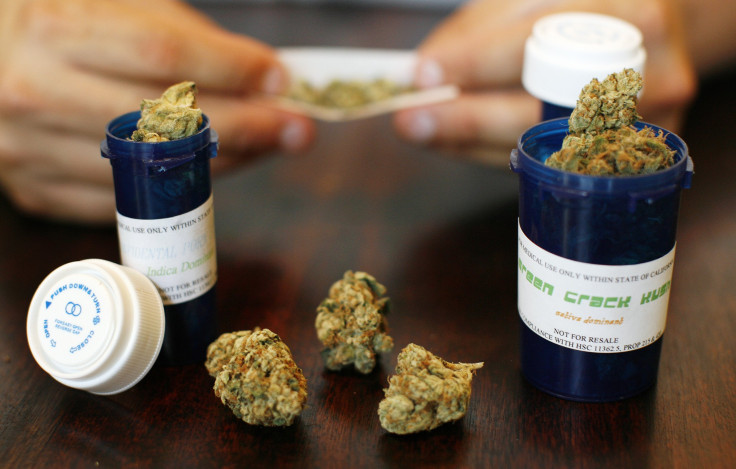Marijuana Business 2015: In Legal Weed Industry, Solutions For Lack Of Banking Access May Lie In Building Relationships

CHICAGO -- In any business, personal relationships often are the key. In the marijuana business, that could be even truer, especially when it comes to banking needs.
Marijuana largely is an all-cash business. Banks are skittish because growing and selling marijuana still is illegal under federal law, which classifies cannabis as a Schedule I drug. But some store owners and others in the marijuana business who have had pre-existing relationships, especially at small community institutions, have been able to convince bankers to work with them, said Chris Walsh, managing editor of Marijuana Business Daily, which sponsored the Marijuana Business Conference and Expo here May 19-21.
Meg Sanders, CEO of Mindful, a cannabis-centered operation based in Denver, said community involvement is extremely important as well. "We call it doing well by doing good. ... We don't go where they don't want us," Sanders said while conducting a crash course on the marijuana business. "It's not worth the fight."
An ingredient in some 600 medicines before the U.S. banned it in 1937, cannabis needs to be presented to the community as a wellness drug to make it more acceptable, especially to women, who are largely responsible for the wellness decisions in their families, Sanders said. She also recommended getting to know government officials and familiarizing oneself with zoning laws.
Meg Collins, the former executive director of the Colorado-focused Cannabis Business Alliance, said those wanting to open a marijuana business must act as information officers, explaining the industry to legislators who have very little time and don't know the business. "Lobbying is an art, not a science," she said in an interview, adding that the industry wants to be well-regulated to diminish the threat posed by federal authorities.
To that end, the U.S. Justice and Treasury departments last year issued guidance opening the way for banks to handle cannabis cash. The memo listed eight priorities:
- Keeping pot away from minors.
- Preventing revenue from going to criminal organizations.
- Stopping legal marijuana businesses from being used as a cover for trafficking in illegal substances.
- Preventing drugged driving.
- Keeping marijuana from growing on federal lands.
- Preventing marijuana from being transported across state lines.
- Stopping violence and firearms use in the cultivation and distribution of cannabis.
- Preventing marijuana possession and use on federal property.
Banks suspecting businesses of violating those guidelines have to file reports with the federal government and close the accounts associated with those enterprises.
"Major credit-card companies have cut ties with this industry. ... It's a gray area," said Lance Ott, CEO of Guardian Data Systems, which has offices in Thousand Oaks, California, and Vancouver, Washington.
All that cash presents a public-safety issue, Ott said. "Rob a convenience store, and you get a few hundred dollars. Rob a [marijuana] dispensary, and you get $200,000 to $300,000. I tell customers they can expect to be hit once every two years in Denver," he said.
Businesses have no choice but to keep large amounts of money on their premises, said Christian E. Sederberg, a partner at the Denver specialty law firm Vicente Sederberg LLC. Adding to the effects of the issue, 50 percent of industry taxes get paid in cash -- and government agencies impose a penalty for that.
Lack of access to bank funds also means no small-business loans. Would-be entrepreneurs are turning to venture capitalists, but such operations are looking for big returns quickly -- something that may not be possible with marijuana startups since there's generally a 25-month lag between the time a license is awarded and a dispensary opens, said Cassandra Farrington, CEO of Marijuana Business Daily.
Research by Marijuana Business Daily indicates 26 percent of possible investors have more than $1 million to invest, and 24 percent have $100,000 to $1 million, with the average return on investment at 40 percent. Only 20 percent of dispensaries reported losing money.
The desire for bank backing has led some companies to resort to subterfuge, pitching their businesses as health-care-related or setting up holding companies so the banks don't know with whom they're dealing, at least initially, Marijuana Business Daily's Walsh said.
Last year, banks closed more than 5,200 accounts belonging to marijuana-related businesses, Ott said. Much of the money in those accounts could be tied up for years or even lost.
Ott, who spoke during the crash course, estimated fewer than 200 banks serve the marijuana industry, largely because financial institutions are afraid of losing their charters.
"It's a ridiculous situation when you look at it," Walsh said, noting a number of banks have pulled out of the industry. "The federal government has allowed the businesses to prosper and thrive, and it taxes the business, too. Yet it created this dangerous situation."
© Copyright IBTimes 2024. All rights reserved.












